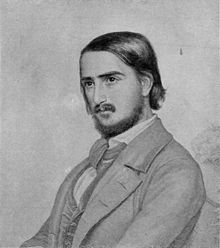Georg Herwegh
Appearance

Georg Friedrich Rudolph Theodor Herwegh (31 May 1817 – 7 April 1875) was a German poet,[1] who is considered part of the Young Germany movement.
Biography
He was born in
Protestant theological seminary. However, he found the strict discipline distasteful; he broke the rules and was expelled in 1836. He studied law for a short time, but decided to return to Stuttgart, and became editor of August Lewald's periodical Europa. Called out for military service, he had hardly joined his regiment when he became embroiled with a military officer with an act of insubordination,[3][4] and had to flee to Emmishofen, Switzerland
in 1839.
His Gedichte eines Lebendigen ("Poems of a living man"[1]) were published in Zürich between 1841–1843 and immediately banned in Prussia. The lyrics combined revolutionary sentiment with a popular style and soon placed him at the forefront of the Vormärz revolutionary movement.[5] The fervent effusions of his poems became immensely popular, so that when, after a short trip to Paris, Herwegh journeyed through Germany in 1842, he was greeted with enthusiasm everywhere.
Lamartine into German (1843–1844).[6]
During the failed
Shakespeare's plays.[6] He died in Lichtental
.
While other poets such as
Alsace-Lorraine in 1870–71. In Herwegh's mind, poetry is a first step towards political action, it should however not be artless. Consequently, he—like Heinrich Heine—defended Goethe
.
References
- ^ The Columbia Encyclopedia(2008)
- ISBN 978-3-406-58154-0.
- ^ Chisholm, Hugh, ed. (1911). . Encyclopædia Britannica (11th ed.). Cambridge University Press.
- ^ a b Rines, George Edwin, ed. (1920). . Encyclopedia Americana.
- ^ Herwegh, Georg (1817–1875). The Crystal Reference Encyclopedia (2005)
- ^ New International Encyclopedia(1st ed.). New York: Dodd, Mead.
External links
- Website (in German) with a lot of information about the historical-critical edition of the poems and writings of Georg Herwegh;
- Works by or about Georg Herwegh at Internet Archive
- Works by Georg Herwegh at LibriVox (public domain audiobooks)

- Two photos of Georg Herwegh memorials at Liestal, Switzerland Archived 13 April 2009 at the Wayback Machine (in German) (search - Suchen - for “Herwegh”)
